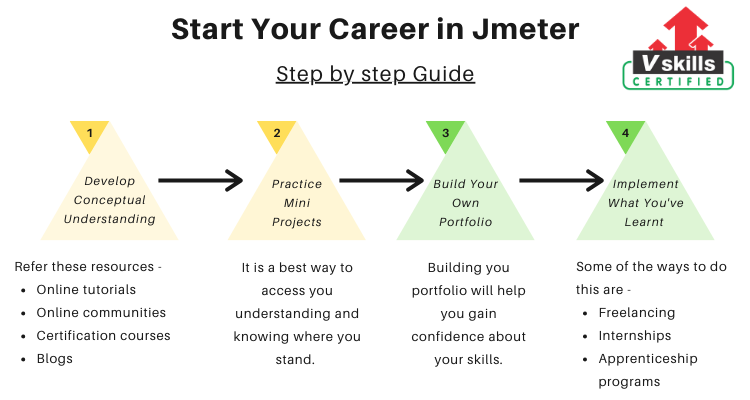Software testing is often evolving, nonetheless, it continues to face new challenges. And automation has tested to be a valuable resolution for testers who face multiple challenges with manual testing. ASCII text file innovation, DevOps, and agile development have contended a giant tributary role within the continual evolution of the testing environment. Amongst them is Jmeter , which is undoubtedly one of the most preferred tools for Performance Testing. Here, we will provide you will all the information that you need to know before getting started.
Let us analyze the career opportunities and the job aspects for Jmeter Professional!
What is Jmeter?
JMeter is a testing tool used for measurement and analysis of the performance of different software services and products. JMeter is based on an integrated development environment (IDE) for checking quality with including debugging. And it also tests the software that works for a web-based environment. Moreover, it can also behave as a unit testing tool for JDBC database connections, LDAP, JMS, HTTP, web services, FTP including OS native processes and generic TCP connections.
Knowledge requirements for learning Jmeter
To start learning about Jmeter, you should have complete knowledge about JAVA. For JMeter testing, you should have knowledge of the JMeter ten basic components. These components of JMeter also refer as Elements. Moreover, each element is designed for a specific purpose.
Why to choose to learn Jmeter over other tools?
It is important to understand why do companies prefer Jmeter professionals and why you should chose to learn Jmeter over other tools. Here are some of the advantages of Jmeter –
- Firstly, JMeter has a comprehensive and user-friendly graphical user interface. Parameters are simpler and clearer to define, scripting is simpler and clearer, and adding and defining elements is more intuitive. Furthermore, one screen displays everything you need – the script, the scenario, and the analysis.
- In addition, JMeter makes it simple to add elements; simply right-click on the tree scenario and add what you require. You can easily fill in the configuration in each element, or you can copy and paste from a text file. Elements can also have comments added to them.
- Furthermore, JMeter’s test scenarios are easier and quicker. JMeter does not require the addition of beginning or ending transaction elements, in addition to allowing for easier element configuration.
- While JMeter does allow for scripting in elements, it is not required. This means you can run a full load test without knowing a single line of code. This increases the number of people who can use JMeter and analyze test results. Even if you do not code, you can benefit from JMeter’s capabilities.
How Can you start your career in Jmeter?
To be acceptable at something, it is critical to have a good start with appropriate assets and learning material. As a result, your first steps toward learning must be appropriate in order for you to be a pro in this field. Let’s take a look at some steps you can take to start your learning process –
Step 1 – Learn about the basics and Develop Conceptual understanding
It is critical to have a solid foundation before becoming an expert in any field. Even before you get your hands on the practical labs, you must have appropriate applied knowledge. Everyone has to start somewhere. If you want to build a successful career in this field, you must start small. You can take the help of following resources for getting complete knowledge and having a complete conceptual understanding –
- Firstly, Online Tutorials for Jmeter
- Also, Certification Courses from verified sources such as Vskills, Coursera, Udemy and so on.
- In addition, Online communities
- Moreover, Blogs and study material from experts in this field and many more.
Vskills also provide Online tutorials, certification courses and free practice tests for the same. You can check them out on our official site.
Step 2 – Practice Mini Projects
If you want to be successful, you must rehearse. It is also the best way to access ones understanding and know where you’re going in terms of putting the knowledge you have gained into procedure. When it comes to practical aspects such as implementing Jmeter in projects, having some experience can help you stand out from the crowd.
You can supplement your learning with the help of reading the blogs and tutorials by various sites which will help you to grasp a better understanding of the practical aspects.
Step 3 – Build Your Portfolio
Building your portfolio will help you develop confidence in your skills as well as provide your learning platform. Your portfolio demonstrates your ability to implement and plan different codes, or how you perform your Jmeter skills impeccably. These duties should include a number of different data sets and allow readers to gather fascinating knowledge. Your portfolio does not have to worry about a specific topic; find codes you are interested in, think about the assembly approach.
Step 4 – Implement your skills in Real world
Execution of the skill you have acquired is extremely important because this is why you learned – to perfectly execute the skill! You must also continue to update yourself and keep on working and developing your own skills with new technological advances. Some of the advance courses can also be used as evidence that you are well aware of advanced skills. Some of the ways through which you can implement your skills are –
- Freelancing
- Internships
- Apprenticeship programs
Above mentioned steps will help you to get started in this domain. However, there is a long way to go. You can take up an advanced course to take your skills to a new level.
Career Opportunities in Jmeter
Selenium work roles differ between organizations, from mobile improvement to the development of web applications. Here are the few jobs that can be considered after you have gained enough knowledge of Jmeter:
- Jmeter Automation Test Analyst – This role requires establishing and evolve formal QA processes, Develop and execute test cases, scripts, plans and procedures, Testing new and updated systems for bugs and other issues, Coordinate bug fixes with development and engineering teams.
- JMeter QA Engineer – This role requires writing functional test cases for new enhancements and subsequently automate them, Ensure overall application test coverage, Understand requirements and provide estimations, Work closely with software engineers, business analysts, and quality assurance analysts to triage reported software issues and Identify and automate test cases to improve the automation coverage.
- Automated Web Applications Tester – Person handling this role is responsible for Provide qualitative and quantitative feedback to the Engineering, Creative, and other teams throughout feature development, Responsible for the reliability of major products/releases, Continually work on improving processes and policies to ensure the best possible product gets shipped and Design and develop automated UI tests with Robotium, XCUI, Espresso, KIF, etc.
- JMeter Expert – Jmeter Performance Engineer is expected to plan, execute performance test scripts, and report results for new features, as well as modify and maintain existing performance testing scripts. Performance Engineer works closely with development team members, QA, Architects, Devops, Project management, Product Management, and Operations to ensure the successful planning, execution, and reporting of the performance tests for new features.
- JMeter QA Developer – Person in this role is required to Connect with stakeholders to understand project purpose and functional requirements, Functional and automation testing of different web applications, Setup Automation suite based on requirements, business cases and User stories, Convert manual test cases into Automation scripts and Perform regression testing for Manual and Automation cases.
Jmeter Applications
Here are some of the applications of Jmeter you should know –
- Firstly, it is for building ad hoc monitoring for some functional testing with simulating heavy load on a server by creating virtual coexisting users to the web servers.
- Secondly, it executes the performance testing, load testing and functional testing of web applications.
- Lastly, it is used for testing the performance of web services like static and dynamic.
Jmeter Roles and Responsibilities
There are many responsibilities you are entrusted with when you get a good job. Some of the obligations you are expected to meet are –
- Functional and automation testing of different web applications.
- Setup Automation suite based on requirements, business cases and User stories.
- Convert manual test cases into Automation scripts.
- Perform regression testing for Manual and Automation cases.
- Provide efforts and estimations based on scope of work.
- Design documentation of automated process.
- Prepare test reports, and defect review with required stakeholders.
- Data verification/validation across MySQL and SQL DBs as per business need.
- Keen to learn and support testing of mobile applications as per business need.
- Ready to perform with Agile and V-model.
Companies that hire Jmeter Professionals
The top-level companies that hire and are looking for Certified JMeter Tester are – TCS, Cognizant, Accenture, Wipro, Genpact, Dell and HCL. We hope to see JMeter’s capabilities rapidly expand as developers take advantage of its pluggable architecture.
The primary goal of further developments will be:
- Support of HTTP/2 protocol
- Possible rework of core architecture to introduce a pool of threads or switch to async model allowing us to take advantage of async io
- Enhancements to Webservices protocols (REST / SOAP)
- Enhancements to JMS protocol implementation
Jmeter Average Salary
Once you are exposed to the top recruiters that might hire you, the next curiosity in your head would be the pay scale of a JMeter Tester. In general, the average salary of a JMeter Tester is 485k per year and the salaries range from 310K – 998K depending upon the knowledge and expertise you bring to the table.

There are always heavy chances for an increase in salary with an increase in industry experience. Nonetheless, one should always remember that there is no shortcut to experience; one must keep oneself indulged in this field and work consistently to grab a lucrative career.
Expert Corner
Performance engineering allows for testing and automation trends that help deliver faster, efficient, and responsive systems that are capable of withstanding the customer expectations and the subsequent loads. It ensures that the product is delivered perfectly in the first attempt rather than working and reworking on the same project. Moreover, it fixes responsibility on every development team, be it designing, coding, QA testing, to ensure high performance in all circumstances. Hence, after knowing that there is good demand for performance testing and Jmeter, it would be beneficial for you to give it a try.
Get started and discover the career opportunities in the field of Jmeter. Hurry up and try free practice tests now offered by Vskills.in!






